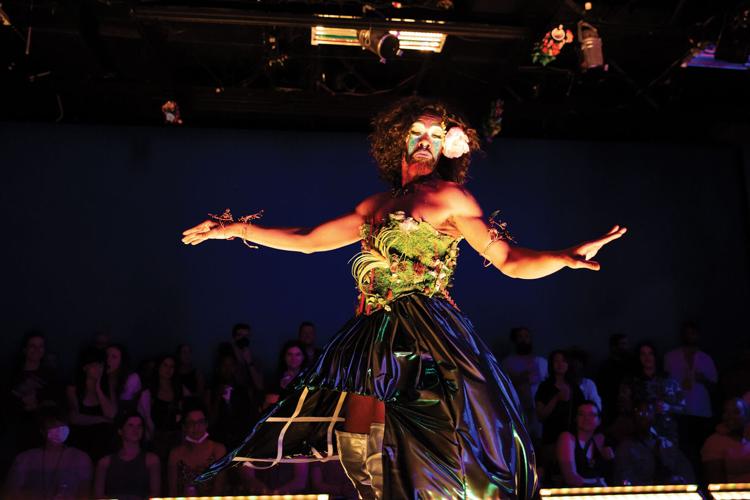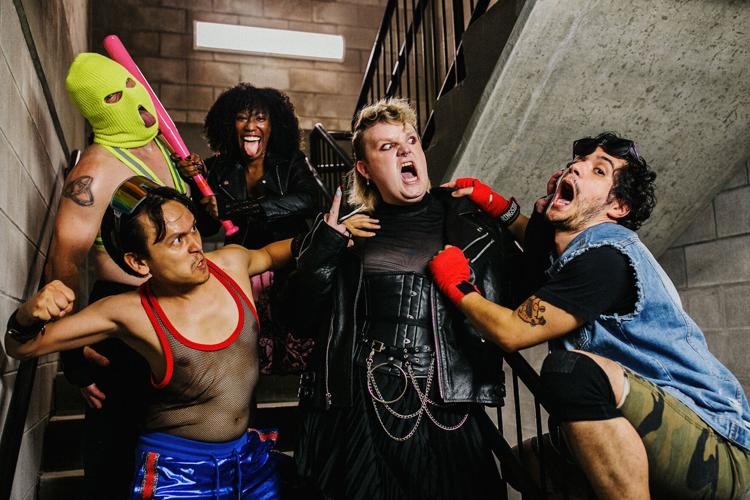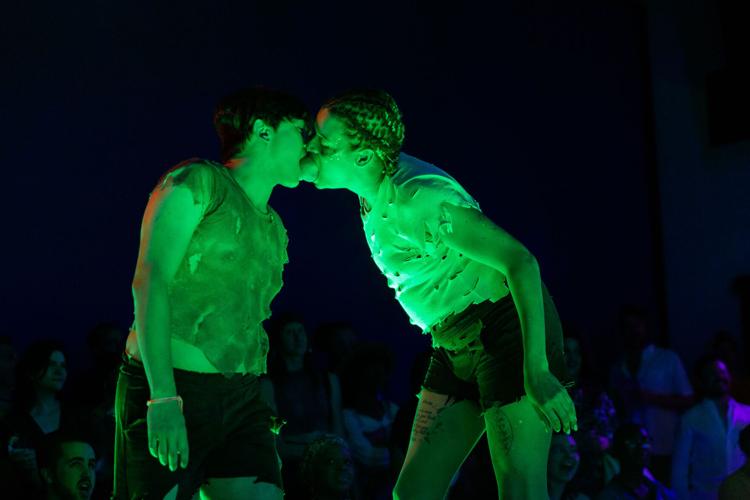
James Rudolph II as Mother Nature in The Naughty Tree at The Blue Room
In 2018, the Kindling Arts Festival launched after three months of planning with a team of fewer than 10 people. Understandably a bit slapdash and uneven, those first few days of programming buzzed with possibility. The air was electric — performance artists are not known for their stoicism — and the festival welcomed experimentation and emerging artists.
Now shepherding the festival into its fifth year, co-artistic-director Daniel Jones looks back and says, “Holy shit — how did we pull that off?”
This year’s festival — which takes place July 28-31 — has a larger staff and more resources. Forty people — including technicians, volunteers and logistical support staff — will produce a four-day festival that takes place across five venues, hosting 19 projects and involving more than 160 artists. Organizers keep the cost of admission affordable with most shows priced at $15 to $20, and several packages tailored to themes and disciplines.
If you can’t find something that interests you at this year’s festival, check your pulse. It promises a solid lineup of theater, dance and community programming that speaks to the topical and the timeless. PYDANCE’s Pool performance is inspired by the desegregation of the Centennial Park swimming pool; Winston Harrison and Derek Pearson’s Interim employs time-lapse photography to explore the nature of time; aerial arts company Suspended Gravity’s Alchemy reminds us of the importance of shared places and communal experiences.
“Our goal is to always be pushing the envelope and be out there challenging ideas, both from a sense of what the art can be, and how it can be experienced,” says Jones.
Co-artistic-director Jessika Malone was born and grew up in Nashville and now works as producing director of Fusebox Festival in Austin, Texas. Her piece in Kindling is born out of the isolation she felt at the height of the pandemic. Sheltering in place meant that she and her collaborators couldn’t create performances in a community setting — it was an “enormous interruption to our rhythm and to our sense of identity.” She missed “the magic of performance and what it meant for bodies to be in space together.”
Malone and her collaborators started talking about what they’d produce when they could work together again. “What did we really want out of performance? What do we love the most about it? What do we want to really lean into? What do we want to celebrate and elevate? We started to think a lot about dance. And we started to think about singing. And we started to think about punching, and all of the things that bodies do. … We just really wanted a very visceral and very joyful experience that we could share.”

The cast of Bar Fight!
They became enamored with what is happening in queer underground fight clubs in cities like London and New York. In these spaces, queer people can express anger and frustration — emotions that are often dangerous to express in public — in a safe, consensual, joyful space. The result is Bar Fight!, which will take place at Ozari Events on Friday and Saturday. Doors open at 8 p.m. for drinks and karaoke in the pop-up bar the artists are building. At 9 p.m, fighters take the stage at the fictional Princess Daddy’s Fight Night & Karaoke, “the underground fight club where songs are slayed and rivalries are laid to rest.” Co-directed by local theater artist and fight choreographer Diego Gomez, the show will feature Gomez, Wanda Amanda Creech, Brooke Gronemeyer, Justin Harvey, Blake Holliday, Josh Inocalla and Nikki Staggs. “They will perform their combat,” says Malone, “they will sing their songs, and we will all share along and hopefully experience a kind of celebratory catharsis that we’re much in need of.”
Speaking of catharsis, The Naughty Tree premiered at Third Man Records’ The Blue Room in April, and it was sensational. Directed by Jones and Lenin Fernandez, the production is a cabaret-style queer telling of the Garden of Eden story. It’s an idea Jones brought to playwright and Woven Theatre co-founder River Timms last summer. They hadn’t worked together before, but Jones saw Timms’ Tall Tales at The Barbershop Theater and approached Timms to share his vision. Timms, who has studied feminist and liberation theology, says Jones “said the exact words that just turn all of my nods to, ‘Yes. I want to do this.’ ”
The production is hilarious and chaotic, moving and raucous, with an effervescent James Rudolph II starring as Mother Nature in drag, with a faux-moss-covered bustier and silver go-go boots. He narrates the story we all know too well — the creation of the universe (courtesy of the Creator, played by Lila Toshiko), the dawn of humans, the forbidden fruit, the serpent, exile. But there are two Adams (Fernandez and Kane Dayton) and two Eves (McKay House and Dee Benn) for added chaos and the possibility of orgies. The Tree is played by statuesque drag queen Justine Van de Blair, and Raven of Back to Black Burlesque plays a sexy Serpent. Jones says choreographer Fernandez “channels the spirits.” His work in The Naughty Tree is tender and sublime.

Kane Dayton and Dee Benn in The Naughty Tree at The Blue Room
The performance also includes poetry to dive more deeply into the themes, and the whole thing is carried through by the weird rockers of Fable Cry. The band members — who perform here in freaky animal costumes — came on board with lots of their own ominous rock numbers, which they altered for the play. It’s rollicking and glam and intense.
“That’s the most fun I’ve had in a theater space ever in my life,” says Timms. “And it came together flawlessly. It was so beautiful. It was so good. I used to be a hardcore-punk kid. … And something that I’ve been trying in my writing to capture is the feeling of being at a punk show. I have never been able to do it until this one.”
The Naughty Tree — which will be staged at 8 p.m. Sunday at OZ Arts — is a celebration of queerness, nonconformity and inclusion. It makes a place for all of us who have felt cast-out to be brought into the fold of a loving, kinky, inclusive spirit. It’s emblematic of Kindling’s programming overall — freewheeling, uncensored and full of heart, pushing the boundaries of what we imagine performance art to be. And to state the obvious, queer-centered stories like The Naughty Tree and Bar Fight! are critically important in states that appear to be committed to eroding the rights of queer people. Kindling has always been self-sustaining, relying on donations from patrons, small grants and the personal savings accounts of organizers. But the lack of institutional support means that artists can take risks that other local gatekeepers will not allow.
“I’m so grateful when I look back that we did just jump in with both feet and say, ‘This is crazy, and this is huge, and we don’t have a lot of time, but, man, we need this,’ ” says Jones. “And the city has continued to show us over and over again that it is still needed more and more.”




